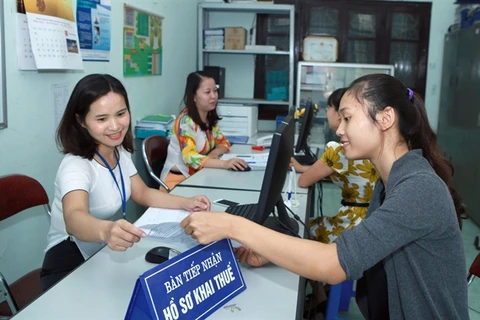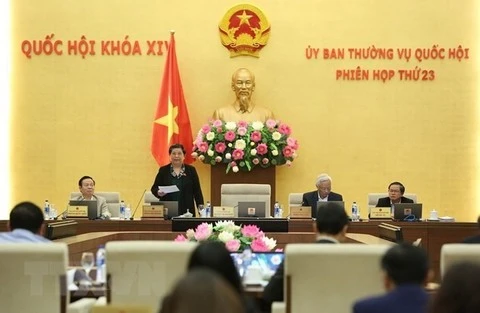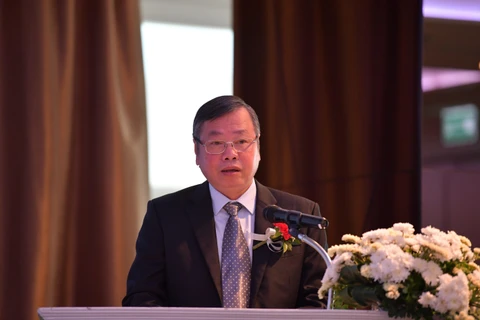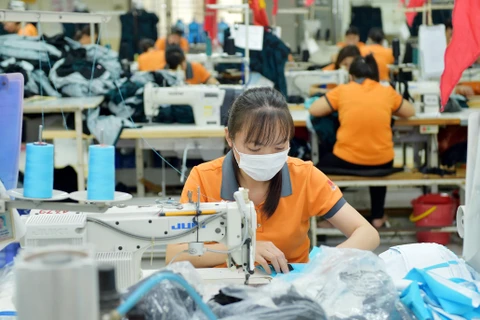Hanoi (VNS/VNA) - Tax incentives had led to a decrease in State revenue in Vietnam over recent years, Nguyen Duc Thanh, Director of the Vietnam Institute for Economic and Policy Research (VEPR), said at a conference in Hanoi on November 13.
The conference, themed "Towards a fair tax system", pointed out that although Vietnam had posted impressive economic growth recently with a ten-year high GDP of 7.1 percent last year and possible higher growth this year, Vietnam’s extraordinary economic track record had not been accompanied by a similar pathway in tax revenues.
Though tax incentive policies had contributed to the country’s economic growth, boosting investment, the conference thought it was time for Vietnam to rationalise such incentives for big companies as lowering corporate income tax rates and the existence of many tax incentives for foreign investors had decreased tax revenues.
“In the long term this could harm the sustainability of the country,” Oxfam’s tax policies expert Johan Langerock told Viet Nam News.
According to data given at the conference, budget revenue decreased from 27.3 percent of GDP in 2010 to 23.7 percent in 2016. Revenue from corporate income tax decreased sharply, from 6.9 percent of GDP in 2010 to 4.3 percent in 2017.
Regarding the fact that tax incentives had attracted foreign investment to Vietnam, VEPR Director Thanh told Vietnam News: “FDI policies should be reconsidered.”
“Enterprises that only arrive in Vietnam to enjoy tax incentives were not the outstanding ones. Outstanding enterprises want transparent tax policies for their investments, not just the incentives,” he said.
Thanh calculated that from 2012-2016, Vietnam's total corporate income tax incentives for businesses accounted for 7 percent of the total state budget revenue, 1.4 times higher than highest budget spending on health in 2012
Agreeing with Thanh, Langerock told Viet Nam News: “The Vietnamese Government gives presents for foreign investors, who will not stay in Vietnam. So it is better to give such presents to local companies, especially the local SMEs.”
Langerock added that certain incentives for local SMEs could help strengthen the economy in the long term as he believed local SMEs had big potential for development and would play an import role in the region in the future.
While Vietnamese authorities have not been paying enough attention to analyzing the efficiency and effectiveness of its tax expenditure policies, a study from the Organisation for Economic Cooperation and Development OECD found the social cost of tax expenditures (meaning those given as tax incentives) in Vietnam was “too large to be further ignored”. According to the OECD, the revenue loss was estimated at 1 percent of the GDP, meaning a staggering amount of over 50 trillion VND (2.15 billion USD).
According to a recent survey by Grant Thornton on private equity prospects in Vietnam, 69 percent considered rising disposal income and middle-income status the most important factors for investing in Vietnam; 60 percent considered high and stable economic growth and only 13 percent considered Government incentives and subsidies as the most important factor.
The Oxfam expert said Vietnam could get rid of large tax incentives without harming its growth or competitiveness.
Langerock said some ASEAN countries were pushing each other into an aggressive race to the lowest corporate taxes. As an example, he said Singapore had created a lot of tax incentives for international enterprises, making itself a “tax haven” that troubled neighbouring countries with unfair competition.
He said as the next ASEAN chairman in 2020, Vietnam should act to stop tax competition, suggesting Vietnam should raise awareness and debate the issue of tax competition and tax incentives at a regional level./.
The conference, themed "Towards a fair tax system", pointed out that although Vietnam had posted impressive economic growth recently with a ten-year high GDP of 7.1 percent last year and possible higher growth this year, Vietnam’s extraordinary economic track record had not been accompanied by a similar pathway in tax revenues.
Though tax incentive policies had contributed to the country’s economic growth, boosting investment, the conference thought it was time for Vietnam to rationalise such incentives for big companies as lowering corporate income tax rates and the existence of many tax incentives for foreign investors had decreased tax revenues.
“In the long term this could harm the sustainability of the country,” Oxfam’s tax policies expert Johan Langerock told Viet Nam News.
According to data given at the conference, budget revenue decreased from 27.3 percent of GDP in 2010 to 23.7 percent in 2016. Revenue from corporate income tax decreased sharply, from 6.9 percent of GDP in 2010 to 4.3 percent in 2017.
Regarding the fact that tax incentives had attracted foreign investment to Vietnam, VEPR Director Thanh told Vietnam News: “FDI policies should be reconsidered.”
“Enterprises that only arrive in Vietnam to enjoy tax incentives were not the outstanding ones. Outstanding enterprises want transparent tax policies for their investments, not just the incentives,” he said.
Thanh calculated that from 2012-2016, Vietnam's total corporate income tax incentives for businesses accounted for 7 percent of the total state budget revenue, 1.4 times higher than highest budget spending on health in 2012
Agreeing with Thanh, Langerock told Viet Nam News: “The Vietnamese Government gives presents for foreign investors, who will not stay in Vietnam. So it is better to give such presents to local companies, especially the local SMEs.”
Langerock added that certain incentives for local SMEs could help strengthen the economy in the long term as he believed local SMEs had big potential for development and would play an import role in the region in the future.
While Vietnamese authorities have not been paying enough attention to analyzing the efficiency and effectiveness of its tax expenditure policies, a study from the Organisation for Economic Cooperation and Development OECD found the social cost of tax expenditures (meaning those given as tax incentives) in Vietnam was “too large to be further ignored”. According to the OECD, the revenue loss was estimated at 1 percent of the GDP, meaning a staggering amount of over 50 trillion VND (2.15 billion USD).
According to a recent survey by Grant Thornton on private equity prospects in Vietnam, 69 percent considered rising disposal income and middle-income status the most important factors for investing in Vietnam; 60 percent considered high and stable economic growth and only 13 percent considered Government incentives and subsidies as the most important factor.
The Oxfam expert said Vietnam could get rid of large tax incentives without harming its growth or competitiveness.
Langerock said some ASEAN countries were pushing each other into an aggressive race to the lowest corporate taxes. As an example, he said Singapore had created a lot of tax incentives for international enterprises, making itself a “tax haven” that troubled neighbouring countries with unfair competition.
He said as the next ASEAN chairman in 2020, Vietnam should act to stop tax competition, suggesting Vietnam should raise awareness and debate the issue of tax competition and tax incentives at a regional level./.
VNA
























